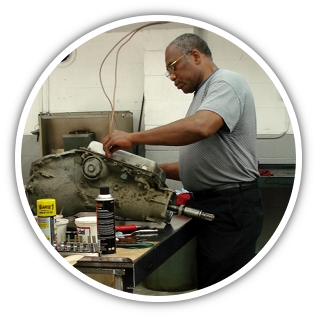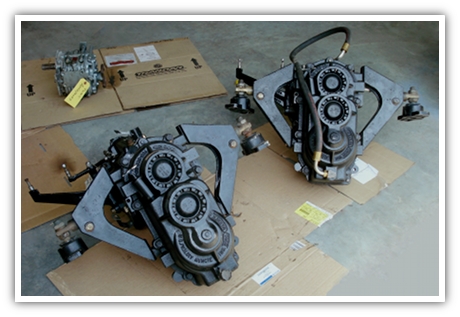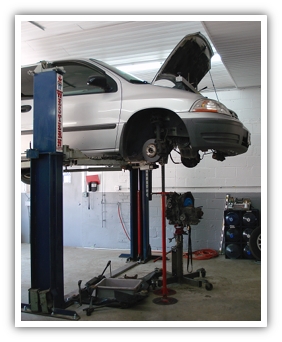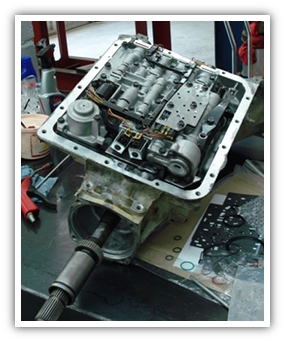
Transmissions - Auto & Marine
We provide full warranties, quick turnarounds, and factory-trained technicians.
Each transmission varies. Call 410-867-7911 to find out the turnaround time, price, and warranty for your transmission.
(go to Frequently Asked Questions)
(go to Marine Transmissions)
In addition to transmissions, we provide parts and service for the following marine accessories: Oil Coolers, CV Joint, Drive Dampeners, Drive Savers, Engines, Heat Exchangers, Shaft Couplings, Torsional Couplings, and anything else you may need.

SELL US YOUR CORES
We will gladly provide a quote for purchasing your core. Just call us at 410-867-7911 with your transmission model number and condition.


Each transmission varies. Call 410-867-7911 to find out the turnaround time, price, and warranty for your transmission.
(go to Frequently Asked Questions)
(go to Marine Transmissions)
MARINE Transmissions
We provide parts, service, and sales for the following types of marine transmissions: Allison, Capital, Hurth, Newage, Paragon, Twin Disc, Velvet Drive, Volvo, Walters, Yanmar, ZF Marine, and others.In addition to transmissions, we provide parts and service for the following marine accessories: Oil Coolers, CV Joint, Drive Dampeners, Drive Savers, Engines, Heat Exchangers, Shaft Couplings, Torsional Couplings, and anything else you may need.

SELL US YOUR CORES
We will gladly provide a quote for purchasing your core. Just call us at 410-867-7911 with your transmission model number and condition.
Frequently Asked Questions (FAQs)
We have provided some FAQs regarding common problems for your convenience. If you have any questions, or would like to make an appointment, please call us.
1. When Should I Come in to Have My Vehicle Checked?- Check engine light is on - we can diagnose any problem that may be happening, including a possible transmission problem.
- Shifting problems - delays when shifting, unexpected shift, or rough shift.
- Vehicle slipping - not accelerating normally.
- Unique sounds - hum, whine, chattering, squealing, clunking, rumbling, or other noises that concern you.
- Transmission leak - if your fluid is low, or there is red fluid where you have parked, you may have a leak.
- Vehicle won't go - this can indicate a serious problem; there may be an internal problem or you may have overheated or low fluid.

2. What Can Shorten My Transmission Life?
- Shifting into reverse while still moving forward - always stop completely before shifting gears.
- Driving before the engine is warm - it takes about 30 seconds for the fluid to warm up to operating tempature; it's most important to do this during the winter.
- Rocking when stuck - if this is done, the transmission may heat up quickly and can damage internal parts.
- Under-qualified service centers may not be able to diagnose your problem correctly or be up-to-date with the repairs and machinery available. It is important to trust your transmission and vehicle needs to a qualified and specialized service center.
3. How Can I Increase My Transmission Life?
- Have problems checked immediately - small problems can quickly escalate to more serious ones; checking problems right away can save you money.
- Follow your vehicle's owner manual's recommended maintenance schedule.
- Check your transmission fluid regularly - follow the instructions in your owner's manual; if your fluid is low, you have a leak.
- Service your transmission regularly - every 25,000 or annually, whichever is first.
- Maintain external coolers - excessive heat is a main cause of transmission failure.
4. What Other Problems Could I Have?

- Broken transmission or engine mount
- Clogged catalytic converter
- Computer sensor malfunction
- Defective oxygen sensor
- Dirty fuel injectors or filter
- Electrical problems
- Engine tune-up needed
- Poor fuel system adjustment
Why is My Transmission Making Noise?
- The most common cause for transmission noise is a poorly running engine. Before singling out the transmission, we recommend checking the compression to ensure it is within ten percent in all cylinders. If it is not, then uneven firing impulses will cause the transmission to make backlash noise. The second most common cause for transmission noise is a bad drive plate. The drive plate absorbs the engine's firing impulses, and a bad one can create variations in firing impulses from the engine and cause noise.
6. Why Won't My Transmission Go Into Gear?
- For hydraulic transmissions, check the transmissions oil level, and make sure it is topped off. Not going into gear is usually caused by a lack of oil pressure.
7. Why Does it Cost So Much to Repair an Automatic Transmission?
- It doesn't when you understand what goes into repairing a transmission. The average automatic transmission today contains more than 3,000 parts. Those with computerized systems and front wheel drive technology are complicated. It is an intricate operation to diagnose the problem and get down to the affected parts. Parts for current model imports can cost up to ten times as much for older models. We are happy to discuss any concern about cost you may have.
How Do I Identify My Transmission Type?
- When transmissions leave the factory, they are labeled with a tag on the top. These tags can get lost, rusted, or be hard to read. For precise identification, please call us at 410-867-7911. Have your transmission visible in case we have questions, and be ready to give us the measurements of its outer dimensions.

